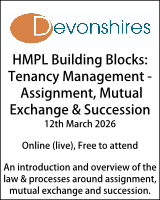Renters’ Rights Bill to end Section 21 ‘no fault evictions’, reform grounds for possession
- Details
The Government has vowed to end no fault evictions and introduce “new clear and expanded” grounds for possession through a Renters’ Rights Bill announced in yesterday’s King’s Speech.
Councils will also be given strengthened enforcement powers, making it easier to “identify and fine unscrupulous landlords and drive bad actors out of the sector”.
The background briefing notes for the speech said: “The Government is determined to address the insecurity and injustice that far too many renters experience by fundamentally reforming the private rented sector and improving the quality of housing in it.
“We value the contribution made by responsible landlords who provide quality homes to their tenants and believe they must enjoy robust grounds for possession where there is good reason to take their property back. However, the Government is determined to level decisively the playing field between landlord and tenant by providing renters with greater security, rights and protections and cracking down on the minority of unscrupulous landlords who exploit, mistreat or discriminate against tenants with bad practices such as unfair rent increases intended to force tenants out, and pitting renters against each other in bidding wars.
“The Renters’ Rights Bill delivers our manifesto commitment to transform the experience of private renting, including by ending Section 21 ‘no fault’ evictions – we will take action where the previous Government has failed. The Bill will give renters much greater security and stability so they can stay in their homes for longer, build lives in their communities, and avoid the risk of homelessness.”
The Bill will:
- abolish Section 21 ‘no fault evictions’, removing the threat of arbitrary evictions and increasing tenant security and stability. “New clear and expanded possession grounds will be introduced so landlords can reclaim their properties when they need to”.
- strengthen tenants’ rights and protections, empowering tenants to challenge rent increases designed to “force them out by the backdoor”, and introduce new laws to end the practice of rental bidding wars by landlords and letting agents.
- give tenants the right to request a pet, which landlords must consider and cannot unreasonably refuse. Landlords will be able to request insurance to cover potential damage from pets if needed.
- apply a Decent Homes Standard to the private rented sector to ensure homes are safe, secure and hazard free – “tackling the blight of poor-quality homes”.
- extend ‘Awaab’s Law’ to the private sector, setting clear legal expectations about the timeframes within which landlords must make homes safe where they contain serious hazards.
- create a digital private rented sector database to bring together key information for landlords, tenants, and councils. Councils will be able to use the database to target enforcement where it is needed most.
- support quicker, cheaper resolution when there are disputes – preventing them escalating to costly court proceedings – with a new ombudsman service for the private rented sector that will provide fair, impartial and binding resolution, to both landlords and tenants and reducing the need to go to court.
- make it illegal for landlords to discriminate against tenants in receipt of benefits or with children when choosing to let their property– “so no family is discriminated against and denied a home when they need it”.
- strengthen local councils’ enforcement powers. New investigatory powers will make it easier for councils to identify and fine unscrupulous landlords and drive bad actors out of the sector.
Responding to the announcement, Cllr Sam Chapman-Allen, Chairman of the District Councils’ Network, said: "We strongly support efforts to improve standards in the social housing sector and strengthen tenants' rights. The implementation of Awaab's Law, while challenging, is an important step towards ensuring all social housing is safe and decent. We urge the Government to work closely with councils to ensure the new requirements can be implemented effectively, with appropriate funding and support.”
"On private rented sector reform, we strongly advocate for comprehensive measures to improve security, affordability and living standards for tenants, whilst recognising that the majority of landlords are responsible. We support the abolition of ‘no-fault’ evictions whilst noting that landlords should still be able to evict tenants who behave anti-socially. The measures should include increasing notice periods as standard, creating a national landlord register, and giving local authorities greater powers to enforce decent home standards and crack down on rogue landlords.”
However, Chris Norris, Policy Director for the National Residential Landlords Association (NRLA), said it was vital that whatever replaces Section 21 works for both landlords and tenants.
He said: “It is vital that rental reform does not make an already serious supply crisis in the private rented sector worse.
“The system that replaces Section 21 needs to be fair, workable and sustainable for both responsible landlords and renters. That means fixing a broken justice system which too often fails those reliant upon it.
“The Housing Minister has rightly noted that landlords need the courts to operate quickly where they have a good reason to repossess a property. This includes cases of tenant anti-social behaviour and serious rent arrears, which currently take almost seven months to process. This is far too long.”
Polly Neate, chief executive of Shelter, claimed the King’s Speech would “restore hope to England’s 11 million renters, whose lives have been plagued by no fault evictions for decades”.
She said: “The new Renters’ Rights Bill has to be a fresh start at reforming broken private renting. Not only does this mean urgently scrapping no fault evictions, but also setting clear limits to in-tenancy rent increases. The government cannot allow landlords to continue to force tenants out of their homes with eyewatering rent hikes.
“If this government truly wants to deliver the biggest increase in social house building in a generation, any new planning legislation must be focussed on delivering 90,000 social rent homes a year. Private developers will not deliver the target 1.5m homes by themselves – councils need the means to build genuinely affordable homes too. Otherwise, their plans will fail, like countless governments before them, and homelessness will remain at a record high.”
Harry Rodd
22-10-2025 4:00 pm
05-11-2025 4:00 pm
13-11-2025 9:30 am
18-11-2025

























